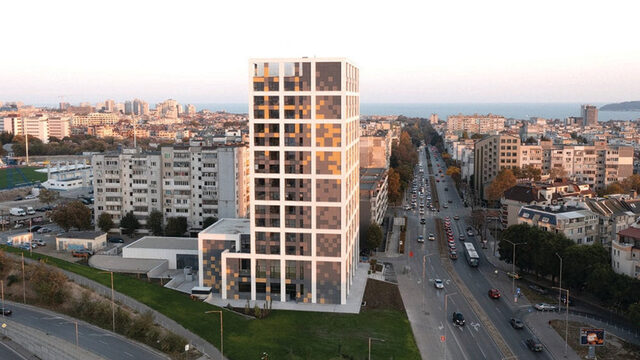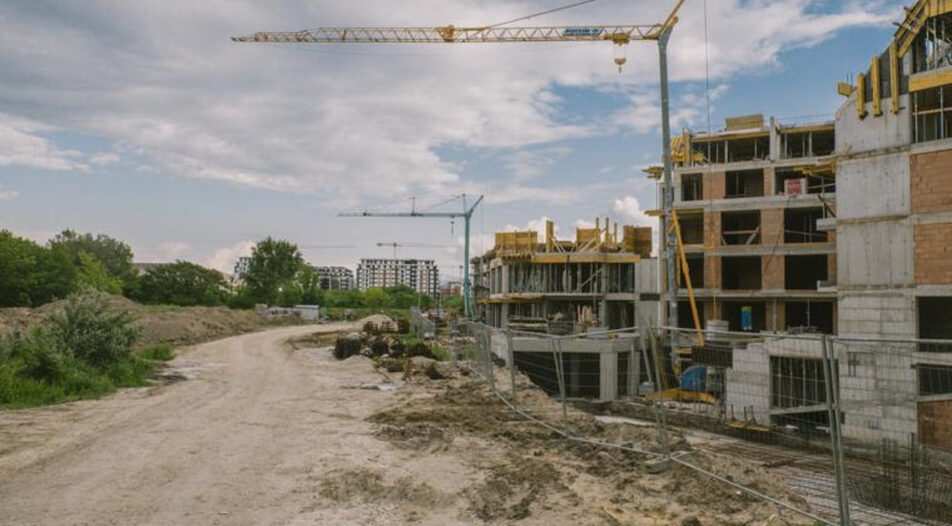Some things are transient, some are not. Mayors, for example, are temporary (at least most of them). Houses, on the other hand, usually endure (unless a disaster strikes). So even with the elections looming, it probably makes sense to speak more about the latter, than the former.
The problem often is, both are intrinsically connected. In Bulgaria's case, more than you might know.
A Capital weekly story this week reported on the cooling housing market. It's down by 13% compared to last year. The number of overall deals in the market is close to 2011 levels - this was the year of the big slump after the Recession. This is the 5th quarter with a fall in deals, which suggests the market keeps on cooling.
That's an understandable trend. The market boomed after the pandemic, hitting unprecedented levels, there are 2 wars not that far away, and a recession in Germany. Everything suggests that a market highly dependent on the overall economy will begin to slow.
Yet two strange things are happening.
First, house prices keep on soaring, even while those in the Eurozone are falling. Bulgaria seems to be an outlier, with housing prices increasing by 10.7, marking the second-highest growth rate in the Union, despite declining real estate market activity. Both new and old housing prices have seen significant growth of 9.5% and 11.4%, respectively.
And second, the overall rate of mortgages remains very low, suspiciously so. Consider this: the capital city has 60.7% of real estate deals concluded with mortgages, which is the highest in the country. In Plovdiv and Varna, the share is 30%. This, when you come to think of it, is a shocking number. "80% of German residential real estate is financed with loan terms of more than five years" says this Deutsche Bank report.
How come Bulgaria, the country with the lowest wages in Europe (statistically, not in real terms but still), has so many people able to buy a home without a loan in a market that gets more expensive? In Plovdiv the median price for a sq.m is somewhere between 1000-1500 euro. In Sofia, it is well above 2000 by now. Also, this is the market with the lowest interest rates in Europe at present - 2.61% median mortgage interest.
Something is way off here.
And I can take a guess what this is. It's a wildly speculative guess, but I'm forced towards it by the facts. What is the most obvious reason for a market to get more expensive, while overall deals are falling, and yet many of the actors in it don't need financial assistance? Clients are willing to pay up, and they have the money. Some of them are probably people who sold other properties. Others paid in cash and have stacked up some savings. But some (and we can argue about the percentage) have made money illegally and are looking for a way to stash it somewhere. Given the highly corrupt nature of the euro-funded Bulgarian craze in the past years, I'd take a bold guess and say there are players like that everywhere in the market. So the cooling of the market will drain away most of the other buyers and leave a highly visible terrain of wealthy customers.
Oh, and by the way, guess what else can be bought if you have lots of money and some real estate projects? That's right. Mayors.
This newsletter is helped by
1. Politics this week:
And here we are: local electionsThis Sunday Bulgaria will revert to its favorite pastime of the past three years - holding elections. This time around the vote will be local, but don't expect a high turnout. People are disillusioned and the energy of the protests has largely evaporated, except in Sofia and among Vazrazhdane's vocal supporters.
This means, as we write in this week's overview, that no huge surprises are likely. The status quo seems to have fortified its positions in all main cities, except for the capital and maybe Plovdiv, mostly because of the failure of WCC-DB to muster recognizable and popular candidates, and do this on time.
The only fortress to fall: Sofia
This leaves the governing coalition with a single city it aims to win so that they can claim at least some credit. The capital saw a weary campaign by the United for Sofia coalition (WCC-DB plus Boris Bonev's Save Sofia) that was marred by the unmasking of their mayoral candidate Vassil Terziev's communist-era secret service family. He is still poised to win the vote in the second round, according to the latest Alpha Research poll. But it might not be against GERB's Anton Hekimyan - trade unionist and BSP candidate Vanya Grigorova is gaining momentum and might take up the second spot before the runoff.
What about the others?
Which will not spare them the question - where have your people gone? While DB-WCC are expected to enter all local parliaments with a sizable group, they will probably not manage to squeeze any major city out of the embrace of GERB-BSP-DPS. Let's face it - this will be a disaster for them, given the high hopes.
2. Economy:
European competition watchdog probes Bulgaria-Turkey gas dealPresident Rumen Radev's caretaker cabinets continue to haunt Bulgaria to this day. One of the surprising and very controversial decisions of the second Galab Donev cabinet - to sign a gas transit deal between the state-owned Bulgargaz gas supplier and its Turkish counterpart BOTAŞ is now under investigation by the European Commission's competition directorate, according to a letter shared by the international commodities think-tank ICIS. The concern is that the contract allows Bulgargaz to monopolize the transit of Turkish gas for the rest of the EU and the Western Balkans and become a sole intermediary for gas secured in Turkey and shipped to the region.
Figures:
46%Of newly built roads are either not straight enough, or lack sufficient asphalt and base, shows an audit by the Regional Ministry. Those in warranty will be claimed from the companies.
3.2%
Is the growth rate forecast for 2024 by the Finance Ministry, together with 4.8% inflation and a 3% deficit.
3. Business:
Insurance EuroholdThe Bulgarian insurer intends to take the Romanian government to international arbitration over the revocation of the license of its Romanian branch in March, which until then was the market leader in the neighboring country. The company said it has already sent a Notice of Dispute to the Romanian state, which is the first step in the arbitration procedure.
Banking
FIBFirst Investment Bank (FIB) failed to float the impressive EUR 300 million bond issue announced just over a month ago. Raising the significant amount, which exceeds the bank's market capitalization by more than EUR 100 million, proved to be a challenge in the current geopolitical and economic climate, the bank said in a statement.
Retail
ZoraAfter an investment of 33 million levs and more than five years' work on the project, the Zora electronics retailer opened its 23,000 sq.m. logistics center in the Sofia-Bozhurishte Industrial Park.
4. Energy:
Cabinet dedicates 500 million levs to construct new nuclear blocksOn 25 October, the Council of Minister allocated 500 million levs for the construction of the new VII Block of the Kozloduy Nuclear Power Plant (NPP), as well as for the preparation of the launch of construction of an VIII Block down the road. The former ought to be up and running by 2033, while the latter should become operational 2-3 years later. The total power of the two units will be 2,300 MWh. In June of this year, the state-owned power plant signed a contract with Westinghouse Electric for preliminary engineering activities for the construction of a new reactor with AP1000 technology at the site of the NPP.
5. Brussels:
- ECB keeps interest rates stable- The ECB decided to keep interest rates steady for the first time in more than a year amid growing evidence that its unprecedented bout of hikes is helping bring down inflation.
- Bulgaria scores high for rule of law - The European Union is the only region where rule of law standards have held more or less steady amid a continued erosion over the past year, as Russia's war in Ukraine prompted some countries to move closer to the bloc's values, according to the World Justice Project. Bulgaria saw the greatest improvement of any country worldwide in its rule of law score, according to the major index tracking.
- Competing for clouds - The European Parliament requested greater involvement in the European Cloud Services scheme this week. The latter is now under preparation from ENISA (The European Union Agency for Cybersecurity) and is set to introduce controversial sovereignty requirements that would exclude non-European providers from large chunks of the EU cloud market (according to a leaked draft).
6. Watch out for:
People: Unit 29155The infamous Russian kill squad known as Unit 29155 reappeared in the news late last week, after an investigation by The Insider website exposed details about their 2011 operation in Bulgaria that resulted in the destruction of artillery shells bound for Georgia. These are the same guys that tried to kill arms dealer Emilian Gebrev and ex-Russian spy Sergei Skripal. The full story is available here.
Vanya Bedrova
The appointment of the GERB-aligned former head of cabinet in the Cultural Ministry as a content editor for the Bulgarian section of the Euronews TV channel just before the local elections led to a mass walk-out by journalists.
Place:

Varna
Where the so-called Campus 90 incorporates the functions of a student accommodation, a hotel and a conference center. It's the product of a local architecture studio - E-Arch Studio and has just been nominated for the European Union Prize For Contemporary Architecture, named after Mies van der Rohe. Since most modern Bulgarian architecture is not really something to behold, this is a bright spot. We sincerely hope there is more to come!
Institution:
Bulgarian Football UnionHas fired yet another coach of its national team in order to spare criticism of itself. The team has dropped to last place in its qualifying group and is without a win this year. The problems are running deeper than the coach though, since the BFU has had the same president for 18 years, albeit with a short interruption.
Имунитет - Immunity
Is not what a couple from an unnamed South American embassy in Sofia could have counted on, surely, when they tried smuggling 55 kg of cocaine via the Kapikule border crossing. Turkish customs officials became suspicious and launched an inspection, finding the drug meticulously divided and distributed among 52 packages hidden in various sections of the vehicle.Some things are transient, some are not. Mayors, for example, are temporary (at least most of them). Houses, on the other hand, usually endure (unless a disaster strikes). So even with the elections looming, it probably makes sense to speak more about the latter, than the former.
The problem often is, both are intrinsically connected. In Bulgaria's case, more than you might know.












